Homer: The Odyssey
Book X
Translated by A. S. Kline © Copyright 2004 All Rights Reserved
This work may be freely reproduced, stored and transmitted, electronically or otherwise, for any non-commercial purpose. Conditions and Exceptions apply.
Contents
- Bk X:1-55 Odysseus tells his tale: The Bag of Winds.
- Bk X:56-102 Odysseus tells his tale: The Laestrygonians.
- Bk X:103-132 Odysseus tells his tale: Escape from the Cannibals
- Bk X:133-197 Odysseus tells his tale: Circe’s Island
- Bk X:198-250 Odysseus tells his tale: The Magic Spell
- Bk X:251-301 Odysseus tells his tale: Help from Hermes
- Bk X:302-347 Odysseus tells his tale: Encountering Circe
- Bk X:348-399 Odysseus tells his tale: Circe Frees the Crew
- Bk X:400-448 Odysseus tells his tale: He Gathers his Men
- Bk X:449-502 Odysseus tells his tale: He Seeks to Leave
- Bk X:503-574 Odysseus tells his tale: The Death of Elpenor
BkX:1-55 Odysseus tells his tale: The Bag of Winds.
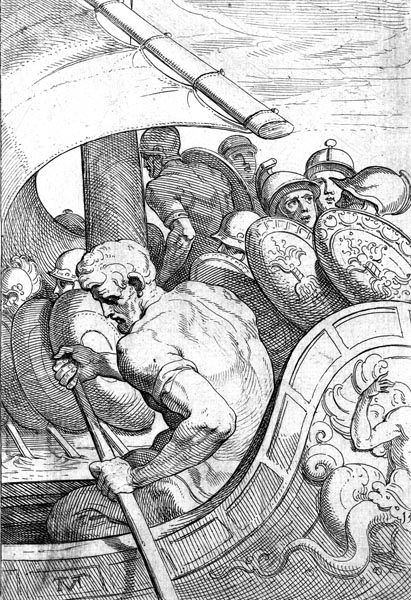
‘Odysseus and armour-clad men on their ships’
‘So we came to the floating island of Aeolia, where Aeolus lived, son of Hippotas, dear to the deathless gods. A wall of unbroken bronze surrounds it, and the cliffs are sheer. In those halls his twelve children live as well, six daughters and six fine sons, and he has given his daughters to his sons in marriage. They are always feasting with their brave father and good mother, with endless good food set before them. All day long the house is full of savoury smells, and the courtyard echoes to the banquet’s sound, while at night they sleep by the wives they love, on well-covered well-strung beds.
We came, then, to their city with its fine palace, and Aeolus entertained me there for a month, questioning me on everything: Troy, the Argive fleet, and the Achaean return. And I told him the whole tale in order. When I asked, in turn, to depart with his help, he too denied me nothing. He gave me a leather bag, made from the flayed hide of a nine-year old ox, and imprisoned all the winds there. The son of Cronos had made him the winds’ keeper, able to raise or calm them as he wished. He placed the bag in my hollow ship and tied it tight with shining silver wire, so not even the smallest breath might escape. But he first called on the West Wind to blow and set my ships and their crews on our homeward course, though it was not to benefit us, ruined by our own foolishness.
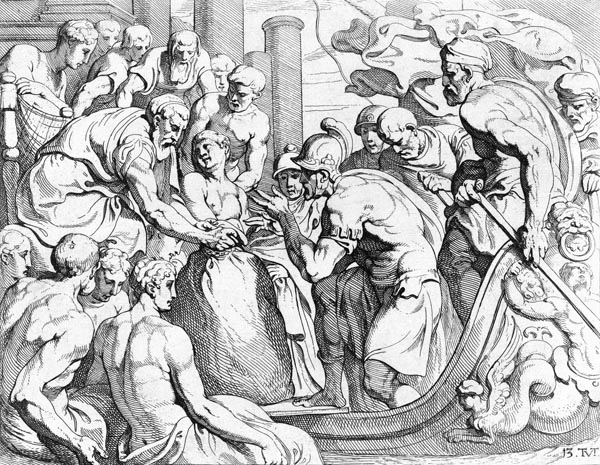
‘Odysseus receives the Bag of Winds’
Nine days and nights we sailed, and on the tenth our own land was in sight, near enough to see men tending fires. Then sweet sleep came to me in my weariness, since I had hauled on the sheets ceaselessly, handing over to none of my crew, in order to reach home more swiftly. Now my men talked among themselves, speculating about the treasures of gold and silver that Aeolus, mighty son of Hippotas, had given me. As they exchanged glances they said: “How honoured and loved Odysseus is by the men of every land and city! He carries home fine things from the spoils of Troy, while we who went the same journey return empty-handed. Now Aeolus, for love alone, gives him all these gifts. Come on, let’s see how much gold and silver there is in the bag.”
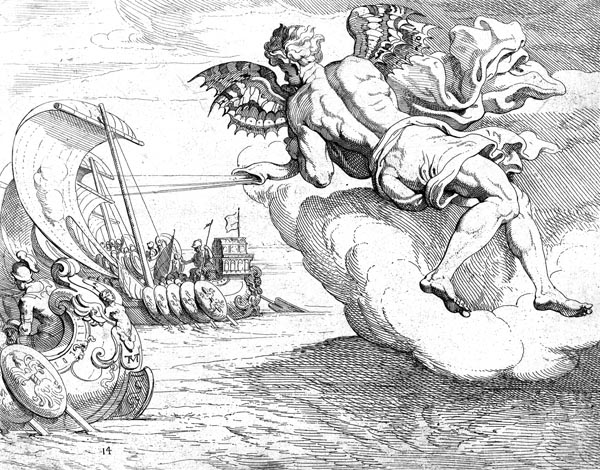
‘The ships of Odysseus, driven by the West Wind’
Among them, talking like this, wicked thoughts prevailed. They opened the bag and all the winds rushed out. Then a tempest seized us, and carried us out to sea away from our own land. Then I woke, and debated in the depths of my heart whether to hurl myself from the ship and drown, or suffer in silence among the living. I stayed and suffered: wrapping my head in my cloak, I lay down on the deck. So, as my men groaned, the ships were carried back to the Aeolian island by a wicked gale.’
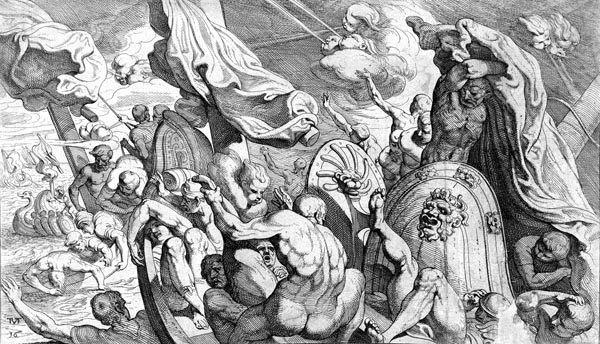
‘Odysseus' companions open the bag of winds’
BkX:56-102 Odysseus tells his tale: The Laestrygonians.
‘We went ashore and replenished our water, my men eating a meal quickly by the swift ships. When we had eaten and drunk, I set out for Aeolus’ fine palace, taking with me a herald and one other of my men. I found the king feasting with his wife and children. We entered and sat down at the threshold by the doorposts. They were amazed, asking me: “Odysseus, how do you come to be here? What cruel god opposed you? We sent you off with care, heading for your home and country, as you wished.”
Sad at heart, I answered: “Sleep and my foolish crew brought me harm, but you, my friends, have the power to set all to rights.” They were silent at my speech, despite its flattering words. Then the father replied, saying: “Leave our island, now, lowest of living men. It would be against religion for me to set a man on his course when the blessed gods revile him. Go, for you come as one the immortals hate.”
With this, he dismissed me from his palace, I groaning deeply. Grieving at heart, we sailed away. The men’s spirits were depressed by the heavy work of rowing, since never a breeze came to help us on our way, because of their foolishness.
Six days and nights we sailed, and on the seventh we reached Telepylus, the great Laestrygonian citadel of Lamus, where the herdsman driving in his flock at the day’s end calls to the herdsman driving his out as the day begins. There night and day is one, and a man who needs no sleep could earn a double wage, one for herding the cattle, one for grazing the white sheep. We reached a fine harbour, with a stretch of sheer cliff on both sides, and narrow access between the opposing headlands, jutting out at its mouth. My captains took their curving ships inside, and moored them close together in the cavernous harbour, since all around us was shining calm, with never a wave, great or small. But I, alone, moored my black ship outside, near the cliffs, making fast to a rock. Then I climbed the rugged headland, and stood there to look out: no cattle could be seen or buildings, only a trace of smoke rising inland. So I sent a party of my men to find out what sort of beings lived there. I chose two to go and a third as herald.’
BkX:103-132 Odysseus tells his tale: Escape from the Cannibals
‘Once ashore, they found a well-worn track down which wagons carried wood to the city from the mountain heights. Near the citadel they came across a girl drawing water, the sturdy daughter of Laestrygonian Antiphates. She had come to Artacia’s flowing stream, from which the city drew its water. They approached her and asked who was the king of her people, and who the people were whom he ruled. She pointed at once to her father’s lofty house.
On entering his fine palace, they found his wife there, massive as a mountaintop, and they were shocked. She called her husband, mighty Antiphates, straight from their gathering place, and he embarked on their cruel destruction. He promptly seized one of my men, and prepared to eat him, while the other two sprang up and fled to the ships. Then Antiphates roused the city, and hearing his cry the huge Laestrygonians crowded in from all sides, a countless host of Giants not men.
From the cliffs they pelted us with the largest rocks a man could lift, and from all the ships there rose the groans of dying men and the splintering of timbers. Spearing the men like fishes, they carried them off to their loathsome feast. While they were killing those in the harbour’s depths, I drew my sharp sword and cut the cable of my dark-prowed vessel. Then calling to my men I ordered them to the oars, so we might escape from danger. With the fear of death on them they thrashed the sea with their blades, and to our joy the ship shot away from the towering cliffs, leaving the rest to founder where they were.’
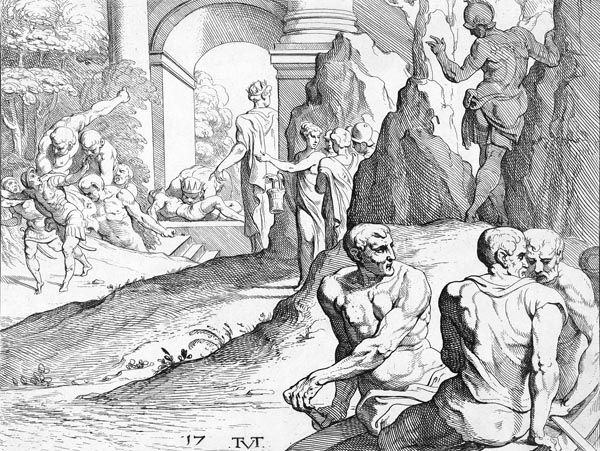
‘Odysseus in the land of the Laestrygonians’
BkX:133-197 Odysseus tells his tale: Circe’s Island
‘So we sailed on, with heavy hearts for the loyal friends lost, though happy to have escaped death ourselves, and came to the island of Aeaea, where Circe of the lovely tresses lived, a fateful goddess with a human voice, sister to dark-minded Aeetes: both children of the Sun that lights the world, and Perse, daughter of the Ocean. Here our ship closed the shore in silence, entering a harbour fit for vessels, guided by a god. When we had gone ashore we lay there for two days and nights consumed by weariness and grief.
But when Dawn of the lovely tresses gave birth to the third day I took my sharp sword and spear and climbed swiftly from the ship to a high lookout point, hoping to see signs of men, and hear their voices. I reached a rocky height with a wide view, and standing there I saw smoke rising through thick scrub and woodland, from the wide clearing where Circe’s halls lay. Seeing that smoke from a fire, I pondered whether to go and explore, but it seemed better to return to the ship and the shore, and allow my men a meal, then send them to investigate.
Then as I neared the swift ship some god took pity on me in that solitude, and sent a huge stag with great antlers right across my trail. The power of the sun had troubled him and sent him down from his woodland pasture to drink at the river’s edge. As he came from the water I struck him on the spine with my bronze-spear, in the centre of his back, and it pierced right through, so he fell in the dust with a groan, and his spirit passed. Then I planted my foot on his carcass, drew the bronze spear from the wound, and laid it on the ground while I gathered willow shoots then wove a rope, six foot long, by splicing them together end to end. Next I tied the great creature’s feet together, and carried him down to the black ship on my back, using my spear to lean on, since he was too large to sling over my shoulder and steady with my hand. I threw him down in front of the ship and cheered my crew with comforting words, tackling each man in turn:
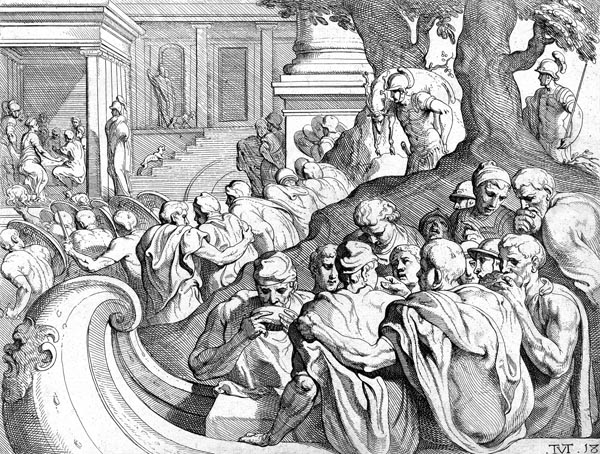
‘Odysseus on the island of Circe’
“We’re not bound for the Halls of Hades ahead of time, my Friends, despite our troubles. Come, while there’s still food and drink in our swift ship, let’s think about eating, not waste away with hunger.”
They soon responded to my words. They drew their cloaks from their faces to marvel at the stag’s huge size, as he lay on the barren shore. When they had sated their sight with gazing, they washed their hands and readied a fine feast. All day long till the sun went down we sat and feasted on meat in plenty, and drank sweet wine. But once the sun had set and darkness fell, we lay down on the sand to sleep. When rosy-fingered Dawn appeared, I called the men together and addressed them all:
“Listen, Friends, and understand our plight. We have no idea how far East or West we are, how far it is to where the light-giving sun rises or where he sinks below the earth. Though we should consider what options we have left, I suspect we have few. I climbed to a rocky lookout point and could see that the island is low-lying, ringed by the boundless waves. And in the centre I saw smoke rising through thick scrub and woodland.”’
BkX:198-250 Odysseus tells his tale: The Magic Spell
‘At this, their hearts sank, remembering Laestrygonian Antiphates, and the fierce violence of the man-eating Cyclops. They groaned aloud, and wept great tears. But all their lamentation did no good.
I split my armed comrades into two groups, each with its own leader. I took command of one, and the other was led by noble Eurylochus. Then we shook lots in a bronze helmet, and brave Eurylochus’s lot leapt out. Off he went with twenty-two tearful men, leaving us behind with our grief. They found Circe’s house of polished stone, in a clearing in the forest glades. Round it wolves and mountain lions prowled, bewitched by Circe with her magic drugs. Instead of rushing to attack my men, they rose on their hind legs and wagged their tails. Like dogs fawning round their master, back from a feast, bringing them the titbits they enjoy, the wolves and sharp-clawed lions fawned round my men, while they seeing these dread creatures were gripped by fear. They stood there at the gate of the goddess with lovely tresses, and they could hear Circe’s sweet voice singing inside, as she went to and fro in front of a vast divine tapestry, weaving the finely-made, lovely, shining work of the goddesses.
Then Polites, the dearest and most trusted of my friends, a man of initiative, spoke: “Friends, a woman, a goddess perhaps, is singing sweetly within, walking to and fro in front of a great tapestry, and the whole place echoes. Let’s call out to her, now.”
At that, they shouted, and called to her, and Circe came to open the shining doors, and invite them to enter: and so they innocently followed her inside. Eurylochus alone, suspecting it was a trap, stayed behind. She ushered the rest in, and seated them on stools and chairs, and mixed them a brew of yellow honey and Pramnian wine, with cheese and barley meal. But she mixed in wicked drugs, as well, so they might wholly forget their native land. When they had drunk the brew she gave them, she touched them with her wand, and herded them into the pigsties. Now they had the shape and bristly hide, the features and voice of pigs, but their minds were unaltered from before. There they wept in their pens, and Circe gave them acorns, beech mast, and cornel fruit to eat, such as pigs feed on as they churn the mud.
But Eurylochus ran back to the swift black ship, to convey the news of his friends and their sad fate. Much as he wished to, he could not speak a word, his heart was so full of anguish, and his eyes filled with tears, and his mind with sorrow. Only when we questioned him, amazed, did he manage to say what had happened to his friends:’
BkX:251-301 Odysseus tells his tale: Help from Hermes
‘“We went through the woods, noble Odysseus, as you ordered. In a clearing in the forest glades we found a fine palace built of cut stone. Someone inside, a woman or a goddess, was singing in a clear voice as she walked to and fro, in front of a huge tapestry. The men shouted and called to her, and she came to open the shining doors, and invited them to enter: and so they innocently followed her inside. But I, suspecting it was a trap, stayed behind. Then they all disappeared, and no one emerged again, though I sat a long time watching.”
At Eurylochus’ words, I slung my great bronze silver-embossed sword over my shoulders, and my bow as well, and told him to take me there by the selfsame road. But he clutched at me with his hands, and clasped my knees, and spoke winged words, through his tears: “Favourite of Zeus, leave me here: don’t force me to return unwillingly. I know you and our comrades will never come back. Let us escape quickly with those who are still here, and we may still evade the day of evil.”
I replied: “Eurylochus, by all means stay here by the black ship’s hull, eating and drinking, but I, bound by necessity, will go.”
With this I climbed away from the ship and the shore. But as I walked through the sacred grove, towards the great house of Circe, a goddess skilled in magic potions, Hermes of the Golden Wand, in the likeness of a young man at that charming age when down first covers the cheeks, met me as I approached. He clasped me by the hand and spoke to me:
“Wretched man, where are you off to, wandering the hills of an unknown island all alone? Your friends are penned in Circe’s house, pigs in close-set sties. Have you come to free them? I tell you, you won’t return, you’ll end up like the rest. But I will save you and keep you free from harm. You must take a powerful herb with you, and go to Circe’s house, and it will ward off the day of evil. I will tell you all Circe’s fatal wiles. She will mix a drink for you, blending drugs with the food, but even so she will fail to enchant you: the powerful herb I will give you will prevent it. Let me tell you the rest. When Circe strikes you with her length of wand, draw your sharp sword and rush at her, as if you intend to kill her. She will be seized with fear. Then she’ll invite you to her bed, and don’t refuse the goddess’ favours, if you want her to free your men, and care for you too. But make her swear a solemn oath by the blessed gods that she won’t try to harm you with her mischief, lest when you are naked she robs you of courage and manhood.”’
BkX:302-347 Odysseus tells his tale: Encountering Circe
‘With this the Slayer of Argus pulled the herb from the ground, and gave it to me, pointing out its features. It was black at the root with a milk-white flower. Moly the gods call it, difficult for mortals to uproot, though the gods of course can do anything. Hermes headed off through the wooded isle to high Olympus, while I approached the house of Circe, thinking black thoughts as I went along.
There I stood, at the gate of the goddess of the lovely tresses, and I called to her and she heard my voice. She came out straight away to open the shining doors, and invited me to enter. I did so, with a troubled heart. Once inside she brought me a beautiful silver-embossed chair, richly made, and with a stool for my feet. Then she mixed me a drink in a golden cup, and with evil intent added her drugs. When she gave it me, and I drank it down, though without feeling its enchantment, she struck at me with her wand, and cried: “Off to your sty now, and lie there with your friends.”
At this, I drew my sharp sword and rushed at her, as if I meant to kill her, but with a cry she slipped beneath the blade to clasp my knees, and weeping spoke to me with winged words: “What man are you, and where are you from? What city is yours? And who are your parents? I wonder that you drank my potion, and were not bewitched. No other man when once he drank, and swallowed it, has ever withstood the spell. Surely your mind is not one to be swayed. You must be Odysseus, that man of many resources whom the Slayer of Argus, with the Golden Wand, told me would come from Troy here, travelling homewards, in his swift dark ship. Come, sheathe your sword, and let us two go to my bed, so we may learn to trust one another by twining in love.”
Those were her words, and I replied: “Circe, how can you demand that I be tender to you, you who have turned my friends to animals in your house, and now detain me, drawing me to your room, to your bed, with cunning intent, to rob me of courage and manhood when I am naked. I have no desire to go to bed with you, goddess, unless you swear a solemn oath by the blessed gods not to try and harm me with your mischief.”’
BkX:348-399 Odysseus tells his tale: Circe Frees the Crew
‘When I had done, she quickly swore an oath not to harm me, as I required. And when she had sworn the oath I went with Circe to her fine bed.
Meanwhile her four handmaids, who serve her round the house, were busy in the hall. One of those children of springs, groves and sacred rivers that run to the sea threw linen covers over the chairs and spread fine purple fabrics on top. Another drew silver tables up to the chairs, and laid out golden dishes, while a third mixed sweet honeyed wine in a silver bowl, and served it in golden cups. The fourth fetched water and lit a roaring fire beneath a huge cauldron. When the water boiled in the shining bronze, she sat me in a bath, and bathed me with water from the great cauldron mixed with cold to suit, pouring it over my head and shoulders till she drew the deep weariness from my limbs.
When she had bathed me and rubbed me with oil, and dressed me in a fine tunic and cloak, she led me into the hall, and seated me on a beautiful silver-embossed chair, richly made, and with a stool for my feet. Then a maid brought water to wash my hands in a lovely golden jug, and poured it out over a silver basin so I could rinse them, and drew up a shining table beside me. The faithful housekeeper brought bread, and set it before me with heaps of delicacies, giving freely of her stores. Then she begged me to eat, though I had no heart for eating. My mind was full of other thoughts and my spirit was full of forebodings.
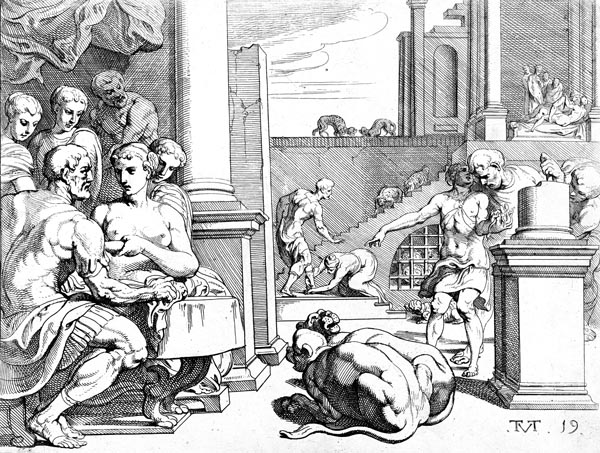
‘Odysseus in Circe's Palace’
When Circe saw me sitting there, not stretching out my hands to the food, but weighed down with sorrow, she approached and spoke with winged words: “Odysseus, why do you sit as if you were dumb, eating your heart out, not touching the food or drink? Are you suspicious of some new ruse? Have no fear, I have sworn you a solemn oath already not to do you harm.”
To this I answered: “Circe, what decent man could bring himself to eat and drink before he had freed his men, and seen them face to face? If you wish me in truth to eat and drink as you ask, then set them free and let me see my loyal friends with my own eyes.”
At this, Circe, taking her wand, went out of the hall and opened the gates of the sty, and drove out what seemed to be full-grown pigs. They stood there and she went among them smearing each one with a fresh potion. Then the bristles, that Circe’s previous hateful spell had made them sprout, fell from them, and they became men again, younger and handsomer and taller by far than they were before. They knew me now, and each man clasped my hands, and all were wracked with weeping, till the walls echoed, mournfully, and even the goddess was moved to pity.’
BkX:400-448 Odysseus tells his tale: He Gathers his Men
‘Then the lovely goddess drew near, and said: “Odysseus, of many resources, scion of Zeus, Laertes’ son, go now to your swift ship and the shore. Drag your ship on land: store your tackle and goods in the caves. Then return with your loyal friends.”
To this my proud heart consented, and I went down to the swift ship and the shore, and there by the speedy vessel I found my faithful comrades, lamenting and shedding tears. Like calves in a farmyard that frisk around the herd of cows that return from grazing, free from their pens and gambolling together, lowing constantly round their mothers, so those men, at the sight of me, crowded round weeping, and in their hearts they felt as though they were home again in rugged Ithaca, in the town where they were born and bred. Still grieving, they spoke with winged words: “We are as happy, favourite of Zeus, as though we were back in Ithaca, but tell us the fate of the rest of our friends.”
I replied with calming words: “First drag the ship on land, and store our tackle and goods in the caves, then hurry, follow me, and you’ll see your friends eating and drinking in Circe’s halls, where there’s enough food and drink to last for ever.” They quickly responded to my words. Only Eurylochus of all my friends hung back. And he spoke to them with winged words: “Wretched fools, where are you off to? Are you so in love with trouble you’ll visit Circe’s house, she who will change you all to pigs, or wolves, or lions to guard her great hall under duress? Remember how Cyclops too behaved, when our friends entered his cave with reckless Odysseus, this man through whose foolishness they died.”
Those were his words, and I felt like drawing the long sword strapped to my sturdy thigh and striking his head to the ground, though he was a kinsman of mine by marriage, but my friends each checked me with soothing words: “Scion of Zeus, let’s leave him behind, if you will, to stay and guard the ship, while you lead us to Circe’s sacred house.”
So we left the ship and shore, but Eurylochus did not stay behind by the hollow hull, he came with us, fearing my stern rebuke.’
BkX:449-502 Odysseus tells his tale: He Seeks to Leave
‘Meanwhile my friends had been bathed in Circe’s house, through her kind ministrations, and had been rubbed with rich oil, and dressed in tunics and fleece-lined cloaks, and we found them feasting happily in the hall. When my two companies saw each other face to face, they wept and moaned in recognition, and the whole house echoed. Then the lovely goddess approached me, saying: “Odysseus, man of many resources, scion of Zeus, son of Laertes, calm this outpouring of grief. I know myself all you have suffered on the teeming waves, and all the wrongs that enemies have done to you on land. But, come now, eat my food and drink my wine, till you each regain the spirit you had when you left your homes on rugged Ithaca. You are spiritless, and drained by endless thought of your harsh journey, and your hearts are always joyless, for in truth you have suffered.”
Our proud hearts yielded to her words. And so we stayed there, day after day, eating food in plenty, and drinking the sweet wine. But when a whole year had gone by, as the months and seasons passed, and the longer days had returned my loyal friends took me aside and said: “Man who is kin to the gods, remember your native country, now, if it is still your fate to escape, and reach your lofty house, and your own land.”
My proud heart yielded to their words. A further long day, till sunset, we feasted on meat in plenty and drank sweet wine. When the sun sank and darkness fell, they settled down to sleep in the shadowy hall, but I went to Circe’s lovely bed, and clasped her knees, and the goddess listened as I spoke winged words: “Circe, keep the promise you gave and send me on my way, since my spirit is eager for home, and so too are my friends’, who weary me with their grief whenever you happen to be absent.”
To this the lovely goddess replied swiftly: “Odysseus, man of many resources, scion of Zeus, son of Laertes, don’t stay here a moment longer against your will, but before you head for home you must make another journey. You must seek the House of Hades and dread Persephone, and consult the ghost of the blind Theban seer, Teiresias. His mind is still unimpaired, for even in death Persephone grants him mental powers, so that he alone has wisdom, while the others flit like shadows.”
At her words my spirits fell, sitting there on the bed I wept, and I no longer wished to live, and see the sunlight. But when I was wearied with weeping and wringing my hands, I answered her, saying: “Circe, who will guide us on the way? No man yet has ever sailed to Hades in a black ship.”’
BkX:503-574 Odysseus tells his tale: The Death of Elpenor
‘The lovely goddess replied swiftly: “Odysseus, man of many resources, scion of Zeus, son of Laertes, don’t think of finding a pilot to guide your vessel, but raise your mast and spread your white sail, and take your seat aboard, and the North Wind’s breath will send her on her way. When you have crossed the Ocean stream, beach your ship by the deep swirling waters on a level shore, where tall poplars, and willows that shed seed, fill the Groves of Persephone. Then go to the moist House of Hades. There is a rock where two roaring rivers join the Acheron, Cocytus, which is a tributary of the Styx, and Pyriphlegethon. Draw near then, as I bid you, hero, and dig a trench two feet square, then pour a libation all around to the dead, first of milk and honey, then of sweet wine, thirdly of water, sprinkled with white barley meal. Then pray devoutly to the powerless ghosts of the departed, swearing that when you reach Ithaca you will sacrifice a barren heifer in your palace, the best of the herd, and will heap the altar with rich spoils, and offer a ram, apart, to Teiresias, the finest jet-black ram in the flock.
And when you have petitioned the glorious host of the dead, with prayers, sacrifice a ram and a black ewe, holding their heads towards Erebus, while you look behind towards the running streams. Then the hosts of the dead will appear. Call then to your comrades, and tell them to flay and burn the sheep killed by the pitiless bronze, with prayers to the divinities, to mighty Hades and dread Persephone. You yourself must draw your sharp sword and sit there, preventing the powerless ghosts from drawing near to the blood, till you have questioned Teiresias. Soon the seer will come, you leader of men, and give you your course, and the distances, so you can return home over the teeming waters.”
Circe finished speaking, and with that came golden-throned Dawn. Then the Nymph dressed me in a tunic and cloak, and clothed herself in a beautiful long white closely-woven robe, and clasped a fine belt of gold around her waist, and set a veil on her head. Then I walked through the halls, rousing my men with cheerful words, speaking to each in turn: “My lady Circe has explained what I need to know: don’t lie there culling the flower of sweet sleep: let us be on our way.”
Those were my words, and their proud hearts yielded. But even now I could not get my men away unscathed. The youngest of all was Elpenor, not one of the cleverest or bravest in battle. Heavy with wine he had climbed to the roof of Circe’s sacred house, seeking the cool night air, and had slept apart from his friends. Hearing the stir and noise of their departure, he leapt up suddenly, and forgetting the way down by the long ladder, he fell headlong from the roof. His neck was shattered where it joins the spine: his ghost descended, to the House of Hades.
My crew were already on their way, as I addressed them: “No doubt you think you are heading home, but Circe has set us on a different course, to the House of Hades and dread Persephone where I must consult the ghost of Theban Teiresias.” At this their spirits fell, and they sat right down where they were and wept, and tore at their hair. But their lamentations served no purpose.
While we made our way to our swift vessel and the shore, grieving and shedding tears, Circe went on ahead of us, and tethered a ram and a black ewe by the black ship. She had easily slipped by us: who can observe a goddess passing to and fro, if she wishes otherwise?’
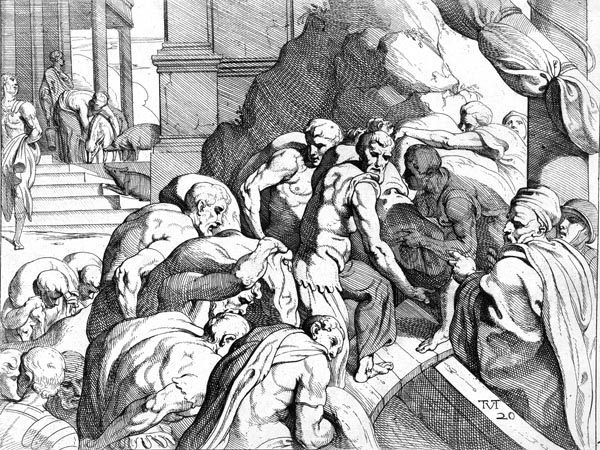
‘Odysseus leaves the island of Circe’